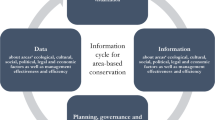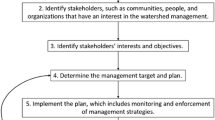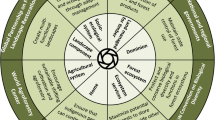Abstract
Climate change presents a challenge to land management agencies tasked with managing landscapes to protect natural resources and provide key goods and services in the face of ecological change, complexity, and uncertainty. Land management agencies, like the U.S. Forest Service, have developed multi-faceted strategies that utilize concepts like resilience and ecological integrity to guide adaptation. To address an extant research need, we conducted a qualitative case study, consisting of interviews with Forest Service staff in the Rocky Mountain Region, to explore how local federal land managers approach adaptation. Our goals were to understand what impacts managers are finding salient, perceptions of current agency strategies, and aspects of policy and practice that support effective adaptation planning. Interview participants anticipate impacts to disturbance regimes, wildlife species, and human uses. Participants intend to draw on agency policies, like its climate change scorecard and its land management planning regulations. However, the participants note that ambiguous concepts, uncertainty, and institutional variables make adaptation planning challenging in practice. A major theme apparent in the interviews was the use of partnerships with a range of other entities to address climate change. Ambiguity associated with concepts like resilience and ecological integrity allow them to function as boundary concepts; however, this ambiguity makes it challenging for managers to operationalize these concepts. These findings revealed that climate change adaptation is leading to and revealing the need for broader governance change. Moving forward, it will be crucial to adjust current governance structures to support long-term partnerships adept at translating scientific knowledge into actions and implementing complex boundary concepts.
Similar content being viewed by others
References
Adger WN, Dessai S, Goulden M et al (2009) Are there social limits to adaptation to climate change? Clim Chang 93:335–354. doi:10.1007/s10584-008-9520-z
Archie KM, Dilling L, Milford JB, Pampel FC (2012) Climate change and western public lands: a survey of U.S. federal land managers on the status of adaptation efforts. Ecol Soc 17:20. doi:10.5751/ES-05187-170420
Ascher W, Steelman T, Healy R (2010) Knowledge and environmental policy: re-imagining the boundaries of science and politics. MIT Press, Cambridge
Berkhout F (2012) Adaptation to climate change by organizations. Wiley Interdiscip Rev Clim Chang 3:91–106. doi:10.1002/wcc.154
Blades JJ, Klos PZ, Kemp KB et al (2016) Forest managers’ response to climate change science: evaluating the constructs of boundary objects and organizations. For Ecol Manag 360:376–387. doi:10.1016/j.foreco.2015.07.020
Bone C, Moseley C, Vinyeta K, Bixler RP (2016) Employing resilience in the United States Forest Service. Land Use Policy 52:430–438. doi:10.1016/j.landusepol.2016.01.003
Brand FS, Jax K (2007) Focusing the meaning(s) of resilience: resilience as a descriptive concept and a boundary object. Ecol Soc 12:23
Burch S (2010) Transforming barriers into enablers of action on climate change: insights from three municipal case studies in British Columbia, Canada. Glob Environ Chang 20:287–297. doi:10.1016/j.gloenvcha.2009.11.009
Carpenter S, Walker B, Anderies JM, Abel N (2001) From metaphor to measurement: resilience of what to what? Ecosystems 4:765–781. doi:10.1007/s10021-001-0045-9
Cash DW, Clark WC, Alcock F et al (2003) Knowledge systems for sustainable development. PNAS 100:8086–8091. doi:10.1073/pnas.1231332100
Chaffin BC, Gosnell H, Cosens BA (2014) A decade of adaptive governance scholarship: synthesis and future directions. Ecol Soc 19:56
Cohen A (2012) Rescaling environmental governance: watersheds as boundary objects at the intersection of science, neoliberalism, and participation. Environ Plan A 44:2207–2224. doi:10.1068/a44265
Corbin J, Strauss A (2008) Basics of qualitative research: techniques and procedures for developing grounded theory, 3rd edn. SAGE Publications, Thousand Oaks
Cosens B, Gunderson L, Allen C, Benson MH (2014) Identifying legal, ecological and governance obstacles, and opportunities for adapting to climate change. Sustainability 6:2338–2356. doi:10.3390/su6042338
Creswell JW (2014) Research design: qualitative, quantitative, and mixed methods approaches, 4th edn. SAGE Publications, Thousand Oaks
Dannevig H, Hovelsrud GK (2016) Understanding the need for adaptation in a natural resource dependent community in northern Norway: issue salience, knowledge and values. Clim Chang 135:261–275. doi:10.1007/s10584-015-1557-1
Dilling L, Lemos MC (2011) Creating usable science: opportunities and constraints for climate knowledge use and their implications for science policy. Glob Environ Chang 21:680–689. doi:10.1016/j.gloenvcha.2010.11.006
Dilling L, Lackstrom K, Haywood B et al (2015) What stakeholder needs tell us about enabling adaptive capacity: the intersection of context and information provision across regions in the United States. Weather Clim Soc 7:5–13. doi:10.1175/WCAS-D-14-00001.1
Fernandez S, Rainey HG (2006) Managing successful organizational change in the public sector. Public Adm Rev 66:168. doi:10.1111/j.1540-6210.2006.00570.x
Golladay SW, Martin KL, Vose JM et al (2016) Achievable future conditions as a framework for guiding forest conservation and management. For Ecol Manag 360:80–96. doi:10.1016/j.foreco.2015.10.009
Graham A, Mitchell CL (2016) The role of boundary organizations in climate change adaptation from the perspective of municipal practitioners. Clim Chang 139:381–395. doi:10.1007/s10584-016-1799-6
Halofsky J, Peterson D, Metlen K et al (2016) Developing and implementing climate change adaptation options in forest ecosystems: a case study in southwestern Oregon, USA. Forests 7:268. doi:10.3390/f7110268
Halofsky JE, Peterson DL, Dante-Wood SK, et al (2017) Climate Change Vulnerability and Adaptation in the Northern Rocky Mountains
Heikkila T, Gerlak AK (2013) Building a conceptual approach to collective learning: lessons for public policy scholars. Policy Stud J 41:484–512. doi:10.1111/psj.12026
Holling CS (1973) Resilience and stability of ecological systems. Annu Rev Ecol Syst 4:1–23
Jantarasami LC, Lawler JJ, Thomas CW (2010) Institutional barriers to climate change adaptation in U.S. National Parks and forests. Ecol Soc 15:33
Kemp KB, Blades JJ, Klos PZ et al (2015) Managing for climate change on federal lands of the western United States: perceived usefulness of climate science, effectiveness of adaptation strategies, and barriers to implementation. Ecol Soc 20:17
Kennedy JJ, Quigley TM (1998) Evolution of USDA Forest Service organizational culture and adaptation issues in embracing an ecosystem management paradigm. Landsc Urban Plan 40:113–122. doi:10.1016/S0169-2046(97)00103-5
Kirchhoff CJ, Lemos MC, Dessai S (2013) Actionable knowledge for environmental decision making: broadening the usability of climate science. Annu Rev Environ Resour 38:393–414. doi:10.1146/annurev-environ-022112-112828
Laatsch J, Ma Z (2015) Strategies for incorporating climate change into public forest management. J For 113:335–342. doi:10.5849/jof.14-128
Lemieux CJ, Thompson J, Slocombe DS, Schuster R (2014) Climate change collaboration among natural resource management agencies: lessons learned from two US regions. J Environ Plan Manag 58:654–677. doi:10.1080/09640568.2013.876392
Lemos MC, Kirchhoff CJ, Ramprasad V (2012) Narrowing the climate information usability gap. Nat Clim Chang 2:789–794. doi:10.1038/nclimate1614
Littell JS, Peterson DL, Millar CI, O’Halloran KA (2012) U.S. National Forests adapt to climate change through science-management partnerships. Clim Chang 110:269–296. doi:10.1007/s10584-011-0066-0
Millar CI, Stephenson NL, Stephens SL (2007) Climate change and forests of the future: managing in the face of uncertainty. Ecol Appl 17:2145–2151. doi:10.1890/06-1715.1
Moser SC, Ekstrom JA (2010) A framework to diagnose barriers to climate change adaptation. Proc Natl Acad Sci 107:22026–22031. doi:10.1073/pnas.1007887107
Moynihan DP, Landuyt N (2009) How do public organizations learn? Bridging cultural and structural perspectives. Public Adm Rev 69:1097–1105
Nagel LM, Palik BJ, Battaglia MA et al (2017) Adaptive silviculture for climate change: a national experiment in manager-scientist partnerships to apply an adaptation framework. J For. doi:10.5849/jof.16-039
National Park Service (2010) National Park Service Climate Change Response Strategy
Pralle SB (2009) Agenda-setting and climate change. Env Polit 18:781–799. doi:10.1080/09644010903157115
Raymond CL, Peterson DL, Rochefort RM (2013) The North Cascadia adaptation partnership: a science-management collaboration for responding to climate change. Sustain 5:136–159. doi:10.3390/su5010136
Resilience Alliance (2010) Assessing Resilience in Social-Ecological Systems
Schultz CA, Jedd T, Beam RD (2012) The collaborative forest landscape restoration program: a history and overview of the first projects. J For 110:381–391. doi:10.5849/Jof.11-082
Star SL, Griesemer JR (1989) Institutional ecology, “translations” and boundary objects: amateurs and professionals in Berkeley’s Museum of Vertebrate Zoology, 1907-39. Soc Stud Sci 19:387–420. doi:10.1177/030631289019003001
U.S. Forest Service (2008) Forest Service Strategic Framework For Responding to Climate Change
U.S. Forest Service (2011a) National Roadmap for Responding to Climate Change
U.S. Forest Service (2011b) The Forest Service Climate Change Performance Scorecard
Vogel C, Moser SC, Kasperson RE, Dabelko GD (2007) Linking vulnerability, adaptation, and resilience science to practice: pathways, players, and partnerships. Glob Environ Chang 17:349–364. doi:10.1016/j.gloenvcha.2007.05.002
Vose JM, Peterson DL, Patel-Weynand T (2012) Effects of climatic variability and change on forest ecosystems: a comprehensive science synthesis for the US Forest sector. For Serv Gen Tech Rep PNW-GTR-870:1–265
Walker BH, Holling CS, Carpenter SR, Kinzig A (2004) Resilience, adaptability and transformability in social-ecological systems. Ecol Soc 9:5
Walker BH, Carpenter SR, Rockstrom J, Peterson GD (2012) Drivers, “slow” variables, “fast” variables, shocks, and resilience. Ecol Soc 17:1–4
Wellstead AM, Howlett M, Rayner J (2013) The neglect of governance in forest sector vulnerability assessments: structural-functionalism and “black box” problems in climate change adaptation planning. Ecol Soc. doi:10.5751/ES-05685-180323
Wilby RL, Vaughan K (2011) Hallmarks of organisations that are adapting to climate change. Water Environ J 25:271–281. doi:10.1111/j.1747-6593.2010.00220.x
Wurtzebach Z, Schultz C (2016) Measuring ecological integrity: history, practical applications, and research opportunities. Bioscience 66:446–457. doi:10.1093/biosci/biw037
Yin RK (2014) Case study research: design and methods, 5th edn. SAGE Publications, Thousand Oaks
Yin RK (2016) Qualitative research from start to finish, 2nd edn. The Guilford Press, New York
Acknowledgements
We thank U.S. Forest Service staff in the Rocky Mountain Region for participating in interviews. Funding was provided by the McIntire-Stennis Cooperative Forestry Research Program and the USDA Forest Service Rocky Mountain Research Station.
Author information
Authors and Affiliations
Contributions
TJT led the data collection, while TJT and CAS together designed the research, analyzed the data, and wrote the manuscript.
Corresponding author
Rights and permissions
About this article
Cite this article
Timberlake, T.J., Schultz, C.A. Policy, practice, and partnerships for climate change adaptation on US national forests. Climatic Change 144, 257–269 (2017). https://doi.org/10.1007/s10584-017-2031-z
Received:
Accepted:
Published:
Issue Date:
DOI: https://doi.org/10.1007/s10584-017-2031-z




